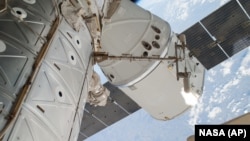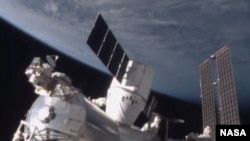A SpaceX Dragon capsule wrapped up a two-day journey to the International Space Station on Monday, the first U.S. cargo run to the orbital outpost in four months, a NASA TV broadcast showed.
Astronauts working inside the station used a robotic crane to pluck the capsule from orbit at 5:54 a.m. EST (1054 GMT) as the spaceships sailed 262 miles (422 km) over the Mediterranean Sea.
“We're excited to have it on board,” station commander Butch Wilmore radioed to Mission Control in Houston.
Dragon became the first U.S. cargo ship to reach the station following a launch accident in October that claimed an Orbital Sciences Corp Cygnus capsule.
Orbital and SpaceX have NASA contracts worth a combined $3.5 billion for station resupply missions.
Privately owned Space Exploration Technologies, the company's official name, had planned to follow Orbital's mission in December, but delayed the launch to review a potential problem with its Falcon 9 rocket.
The booster successfully lifted off from Cape Canaveral Air Force Station in Florida on Saturday.
After sending the Dragon cargo ship on its way to orbit, the discarded rocket turned around and attempted to land itself on a platform in the Atlantic Ocean located northeast of the launch site.
The 14-story tall rocket ran out of hydraulic fluid to maneuver its steering fins and crashed, but managed to hit the 300-by-100 foot (91-by-30 meter) platform, bolstering confidence in the company's long-term goal to land and reuse its rockets.
“Bodes well for the future,” SpaceX founder and Chief Executive Officer Elon Musk posted on Twitter.
The company will attempt the ocean landing again on its next mission, slated for liftoff from Florida on Jan. 29.
The Dragon capsule is loaded with more than 5,100 pounds (2,313 kg) of food, clothing, equipment and science experiments for the six-member station crew. The cargo includes an instrument that will measure clouds and aerosols in Earth's atmosphere.
The capsule will remain docked to the station for about four weeks before flying back to Earth.






